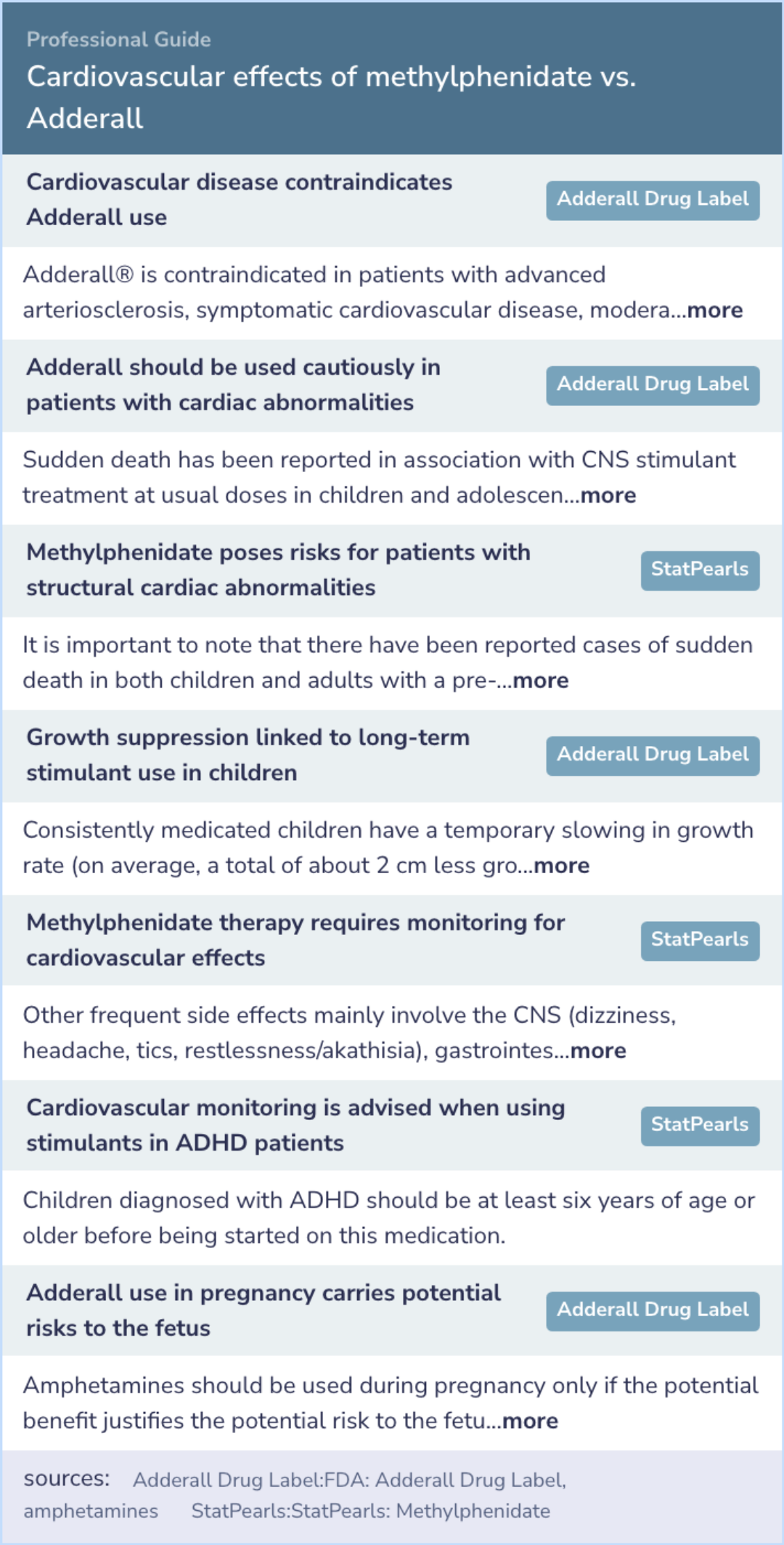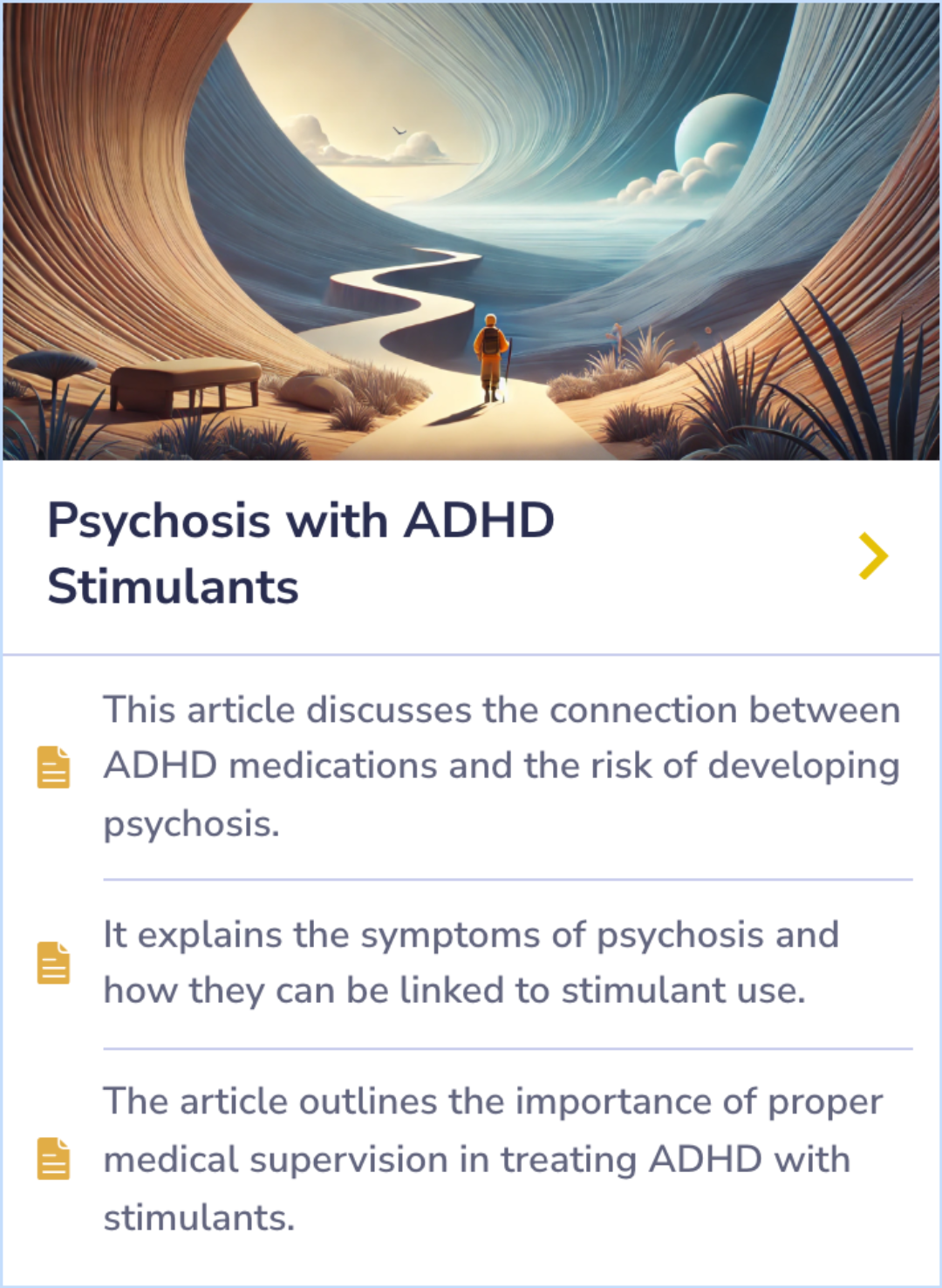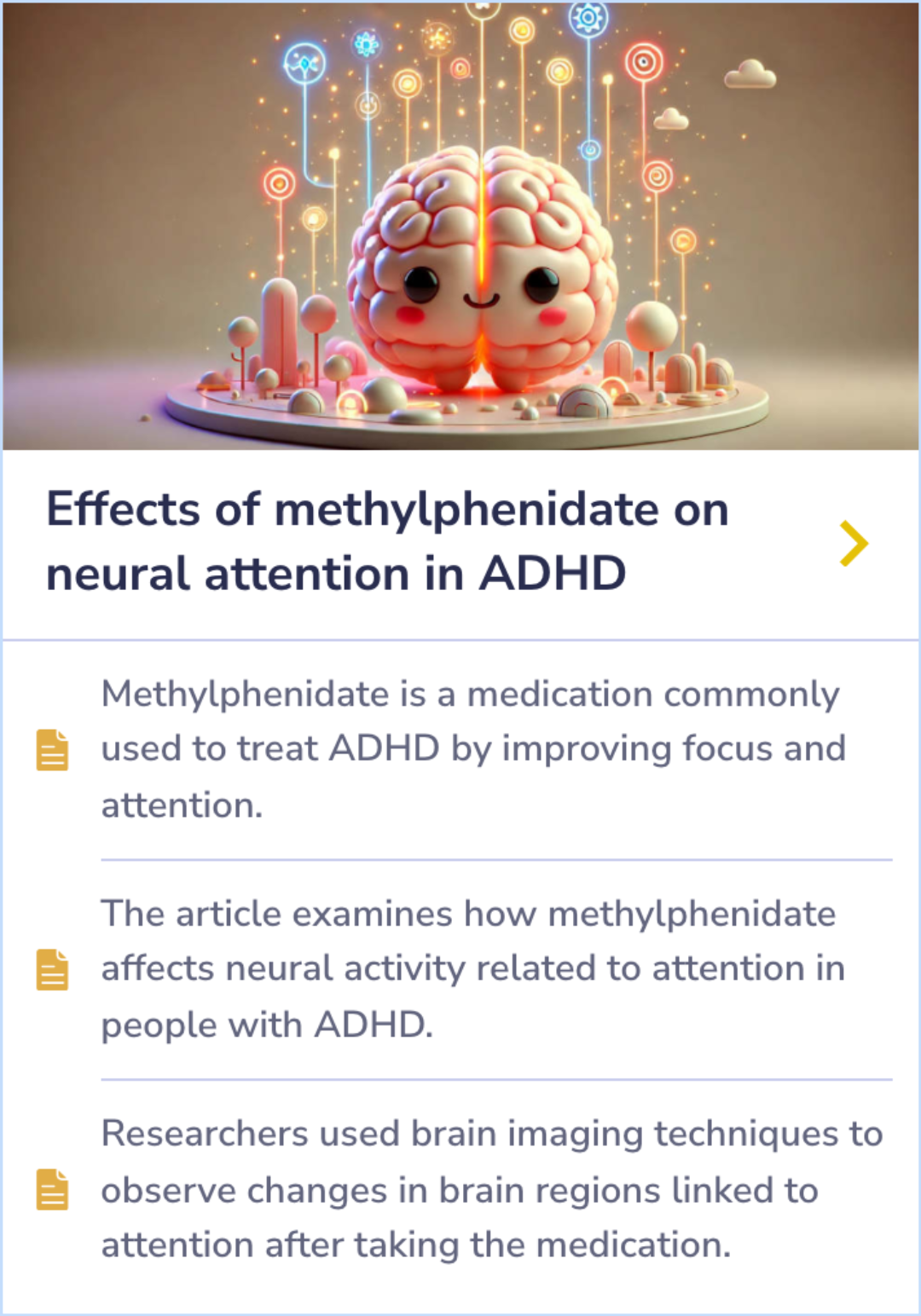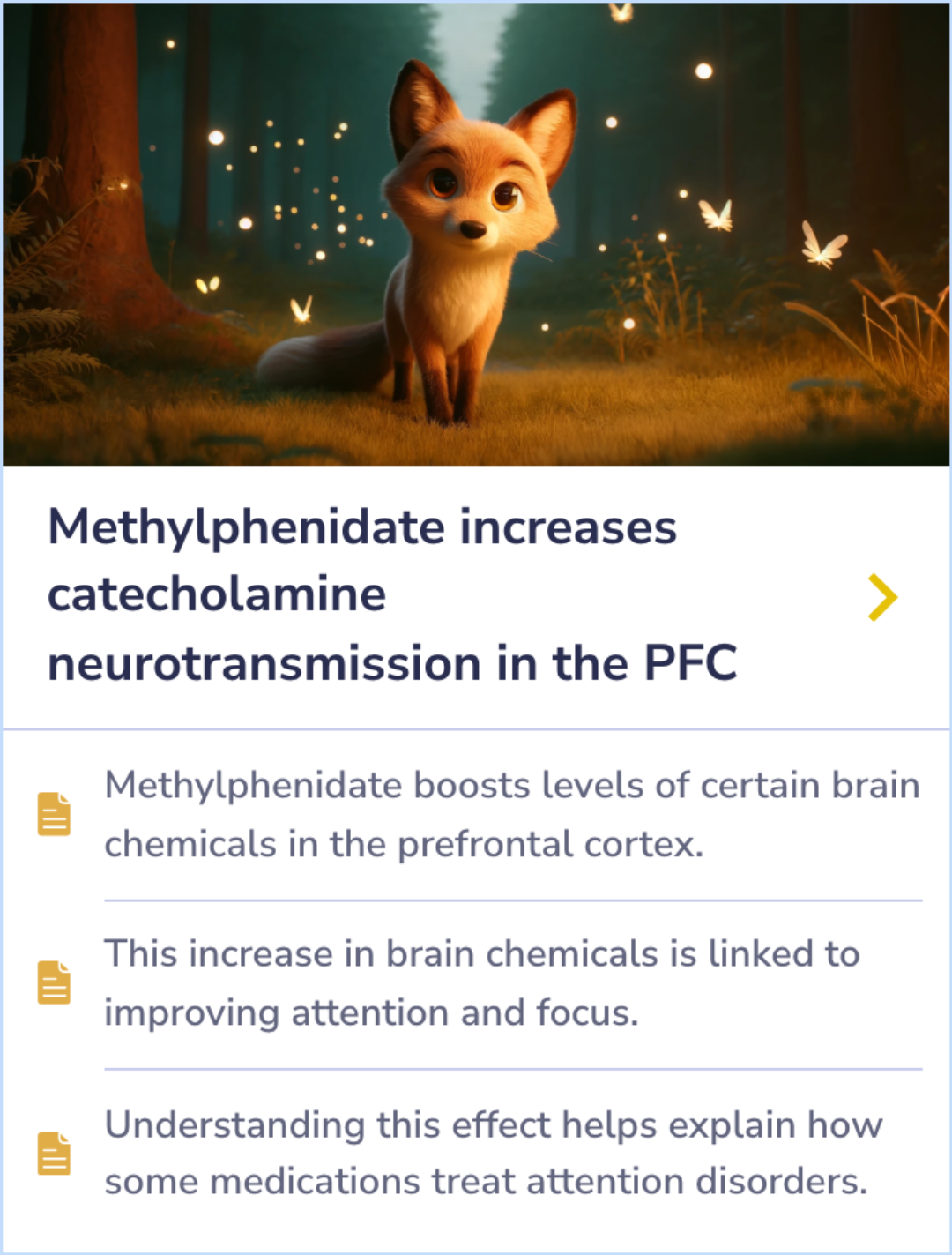Adderall Study Database
Visual Abstract
Short-term cardiovascular effects of methylphenidate and adderall
Cardiovascular effects of methylphenidate vs. Adderall
September 12, 2024
author
Findling RL, Short EJ, Manos MJ
journal
J Am Acad Child Adolesc Psychiatry
Date Published
2001 May
Why link to a visual abstract?
What is a visual abstract?
Original
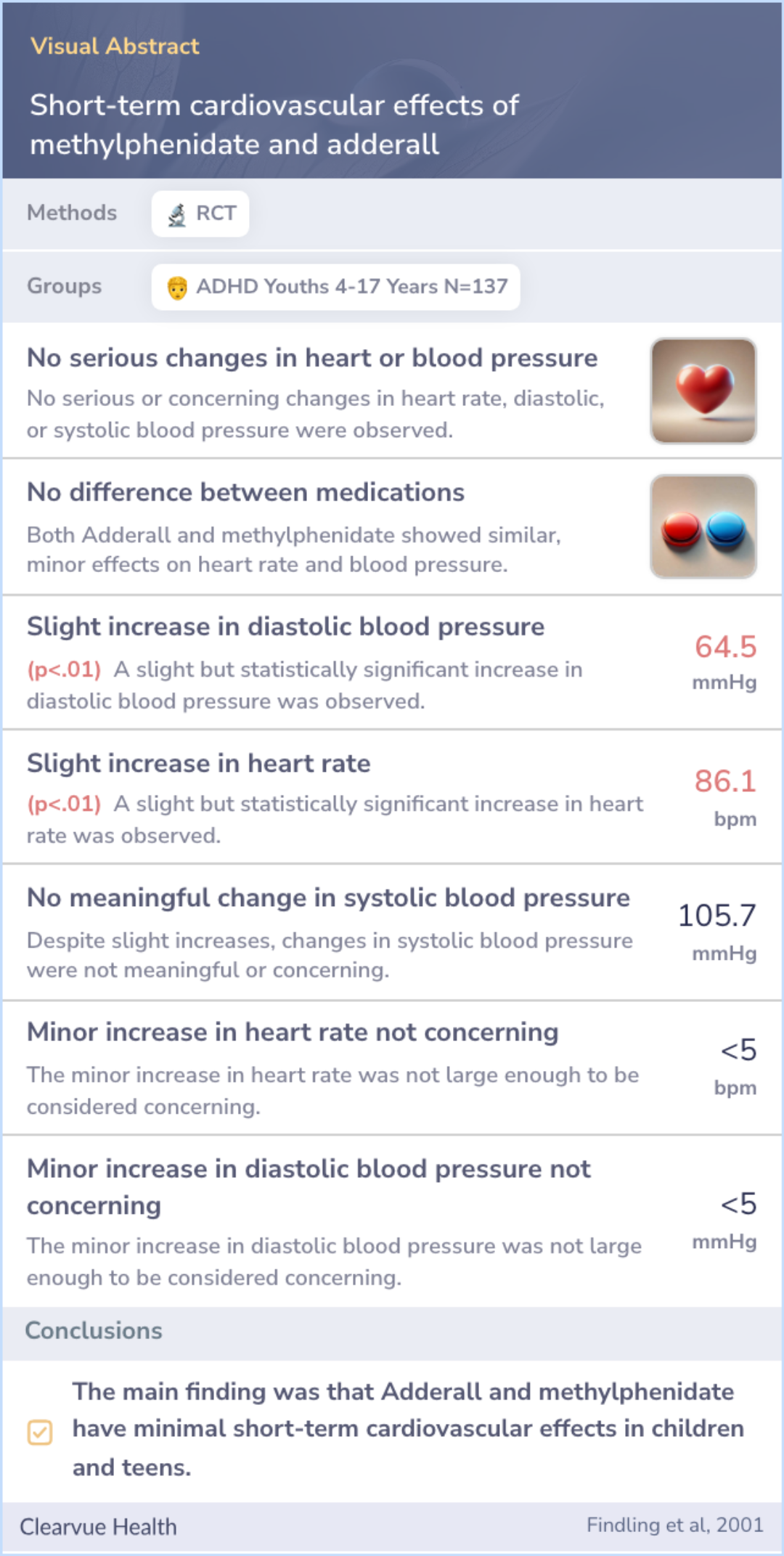
Study Summary
🔬
What They Studied
The researchers aimed to examine the cardiovascular effects of Adderall in youths aged 4 to 17 with ADHD.
💡
What They Found
The study found that both Adderall and methylphenidate had modest short-term cardiovascular effects, with no clinically significant changes.
📚
What This Means
These results suggest that short-term use of Adderall at doses up to 15 mg/day doesn't require specific cardiovascular monitoring due to minimal effects on blood pressure and pulse, aligning with the lack of severe cardiovascular risks presented in current guidelines.
Study Summary
Study Overview
In this study, researchers looked at the heart health effects of Adderall in young people with ADHD. They found that both Adderall and another medication, methylphenidate, had minor short-term impacts on heart rate and blood pressure.
The changes were not severe enough to need any special heart checks during treatment. For doses up to 15 mg a day, the findings align with existing guidelines that also highlight the low risk of significant heart issues with these medications.
The changes were not severe enough to need any special heart checks during treatment. For doses up to 15 mg a day, the findings align with existing guidelines that also highlight the low risk of significant heart issues with these medications.
Abstract: background
The primary purpose of this study was to examine the cardiovascular effects of Adderall (ADL) in a clinic-based group of youths with attention-deficit/hyperactivity disorder ranging in age from 4 to 17 years.

Safety of ADHD Medications
"This is the first study that has systematically assessed the cardiovascular effects of ADL and one of the largest studies that has specifically considered the cardiovascular effects of psychostimulants in young people."
Comparative Effects
"The cardiovascular effects of ADL and MPH during the course of this trial were modest in youths without significant cardiovascular disease."
Monitoring Needs
"These results suggest that when given at doses of 5, 10, or 15 mg/dose, cardiovascular monitoring during a brief therapeutic trial of MPH or ADL is not generally necessary."
Study Summary
Methods
In this study, 137 young patients were divided into two groups. One group took methylphenidate (MPH), known by the brand name Ritalin, while the other group took Adderall (ADL). Those on MPH were instructed to take the medication twice daily, while the Adderall group took their dose once a day. The researchers monitored the children under different conditions.
These conditions included their initial state with no medication (baseline), taking a placebo, or receiving varying doses of 5 mg, 10 mg, or 15 mg of the medications. The team measured resting heart rates and blood pressures each week to monitor any changes from the initial baseline.
These conditions included their initial state with no medication (baseline), taking a placebo, or receiving varying doses of 5 mg, 10 mg, or 15 mg of the medications. The team measured resting heart rates and blood pressures each week to monitor any changes from the initial baseline.
Abstract: methods
One hundred thirty-seven patients were treated with either methylphenidate (MPH) or ADL. Youths prescribed MPH were given medication twice daily, and youths treated with ADL received medication once daily. Patients were evaluated under five condition...more

Study Summary
Results
The findings demonstrated that the immediate effects of both Adderall and the other medication, Ritalin, on heart health indicators were relatively mild. Throughout the short duration of this study, none of the participants experienced any concerning changes in their heart rate or blood pressure. In essence, despite being monitored closely, the medications did not cause significant shifts in these important measures of cardiovascular health in the short-term trial period.
Abstract: results
The short-term cardiovascular effects of both ADL and MPH were modest. No patients experienced any clinically significant change in these cardiovascular measures during the course of this brief trial.
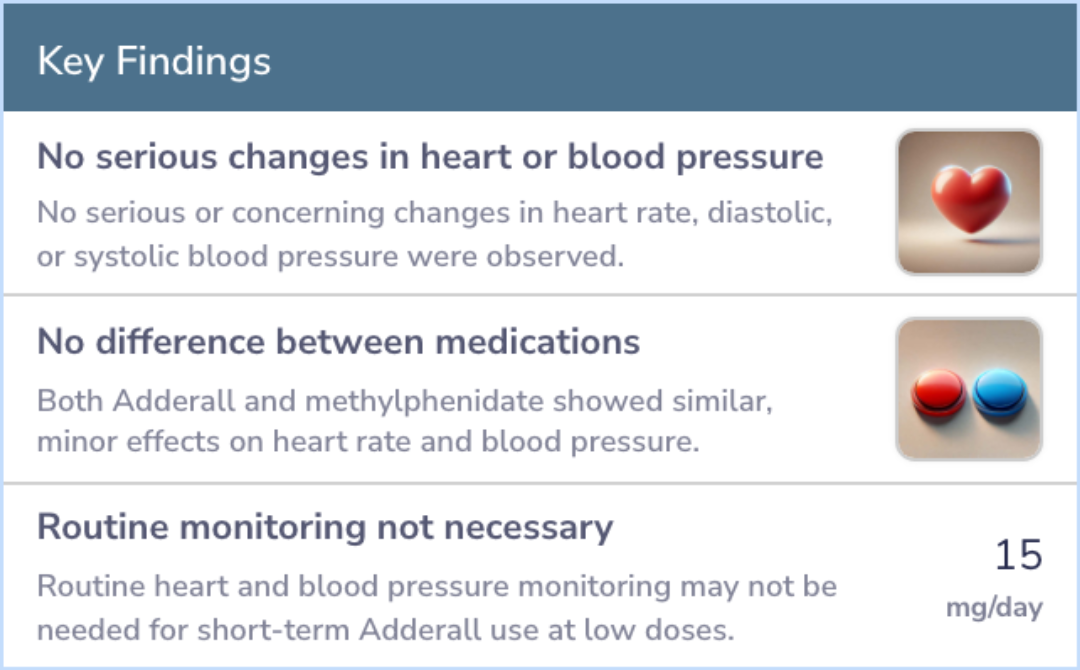
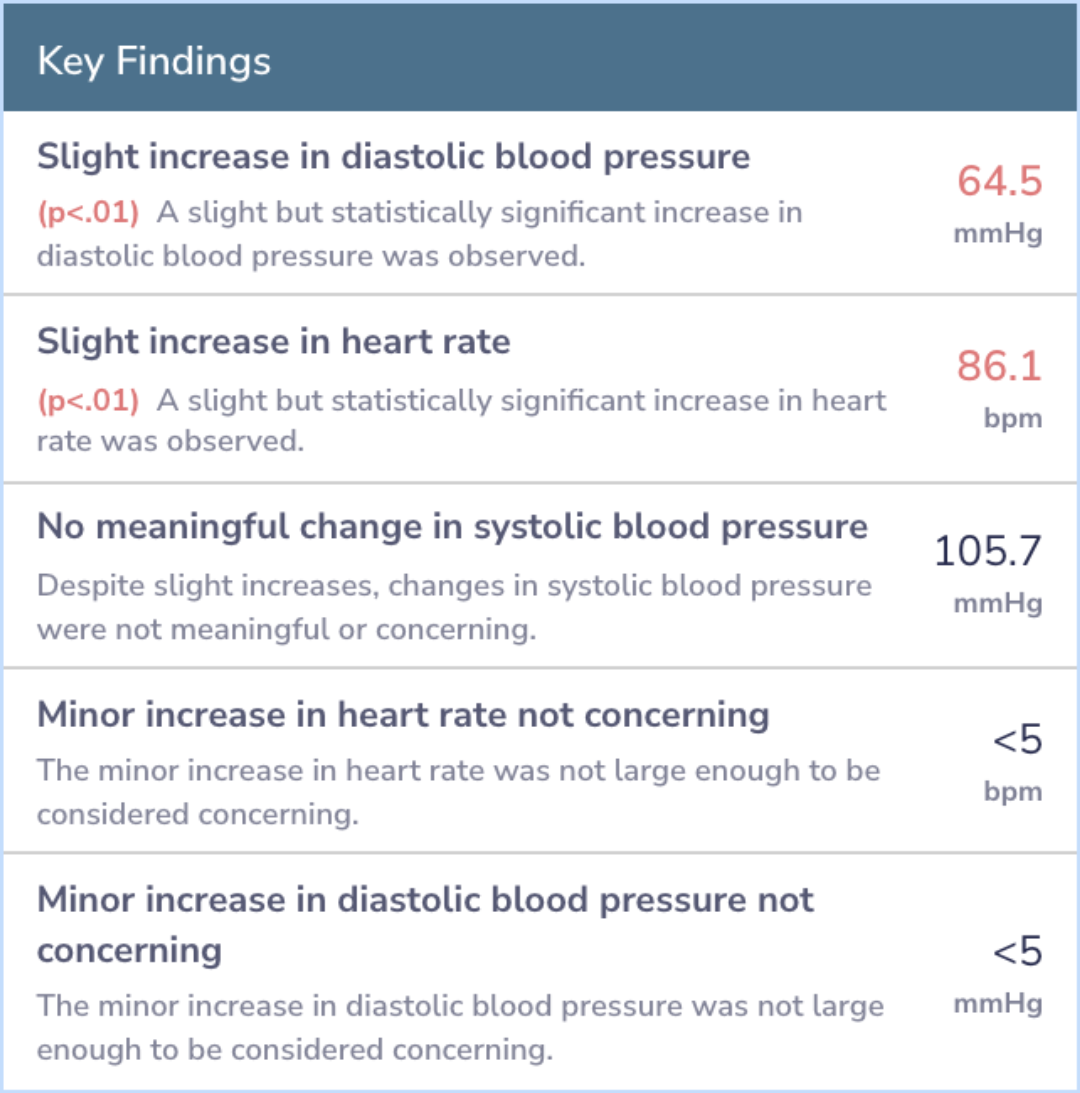
Study Summary
Conclusions
Given the minimal short-term impact of Adderall on heart and blood vessel health, the researchers suggest that intensive cardiovascular monitoring might not be necessary for short-term use, especially at doses of 15 mg per day or less.
Similarly, when following similar approaches, the use of both Adderall and Ritalin appeared safe with respect to heart rate and blood pressure changes.
Similarly, when following similar approaches, the use of both Adderall and Ritalin appeared safe with respect to heart rate and blood pressure changes.
Abstract: conclusions
Since the short-term cardiovascular effects of ADL appear minimal, specific cardiovascular monitoring during short-term ADL treatment at doses of 15 mg/day or less does not appear to be indicated. In addition, under similar conditions, using similar ...more
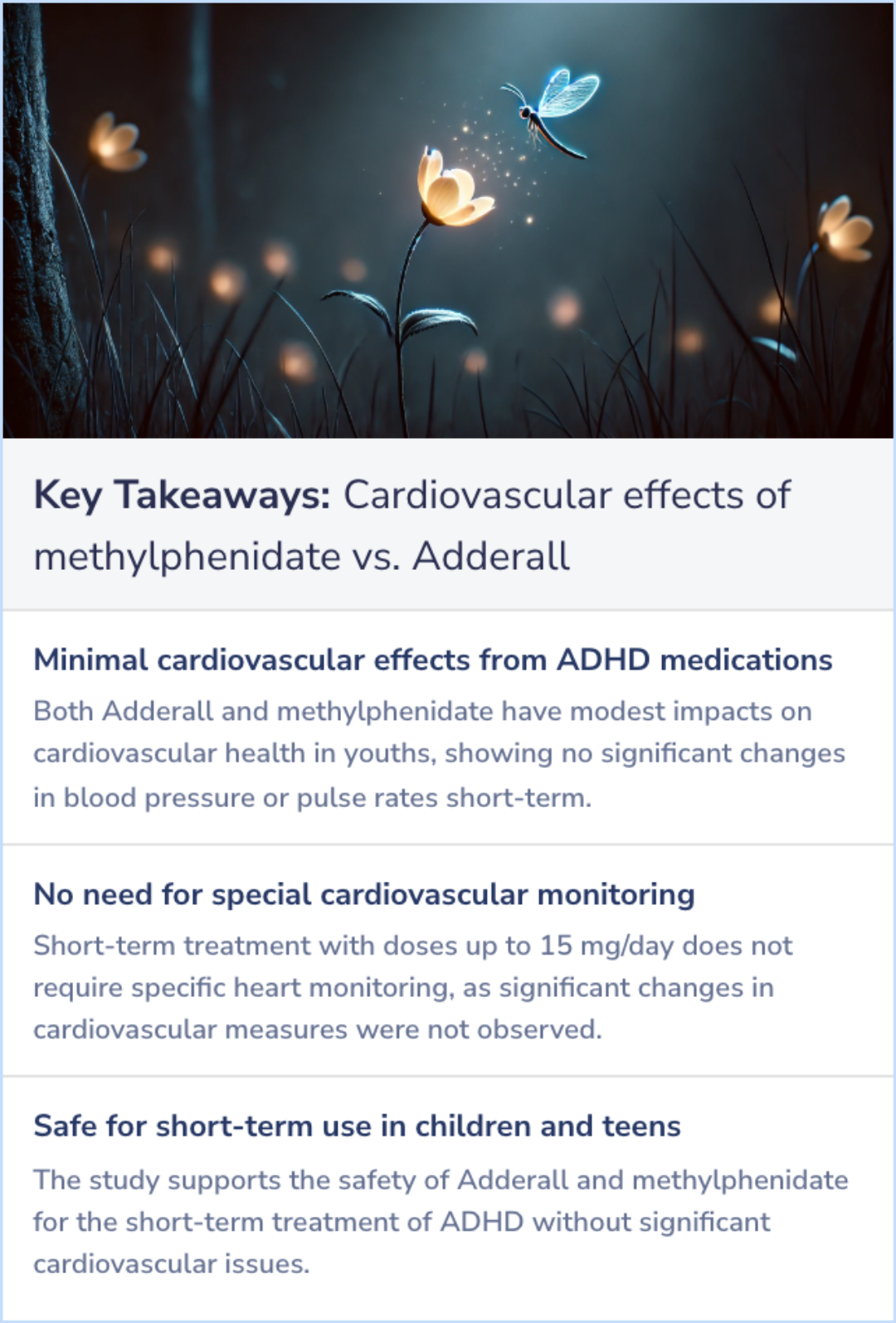
Background Information
Patient Guide
❤️
Methylphenidate Cardiovascular Risks
Methylphenidate can worsen heart issues like palpitations, caution advised for patients with heart conditions.
❤️
Adderall's Cardiovascular Impact
Adderall may increase heart rate and blood pressure; severe cardiovascular events are rare but noted.
💊
Indications for Adderall
FDA approved Adderall for treating ADHD and narcolepsy, enhancing attention and reducing impulsivity.
❤️
Cardiac Monitoring for Adderall Users
Regular cardiac evaluations recommended for Adderall users with known cardiac anomalies.
🧠
Combining Adderall with Psychological Interventions
Adderall may be part of a holistic ADHD treatment plan that includes psychological support.
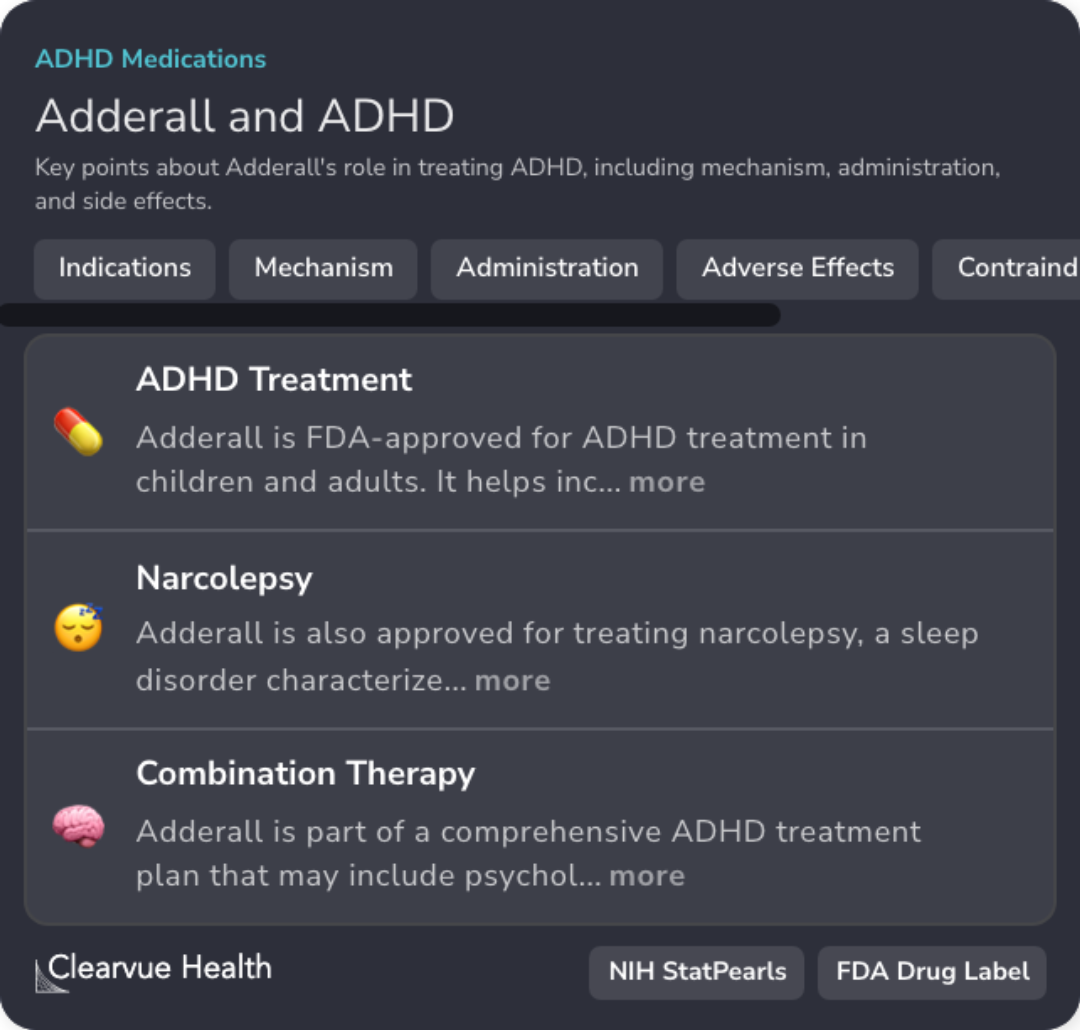
Professional Guide
Expert Opinion: Cardiovascular effects of methylphenidate vs. Adderall
In examining the cardiovascular effects of ADL in youth with ADHD, the well-documented contraindications for Adderall highlight that it should not be used in those with advanced arteriosclerosis or symptomatic cardiovascular disease.
Such caution aligns with findings where both ADL and MPH proved to have minimal cardiovascular impacts in the short term.
However, reports of sudden death in those with structural cardiac abnormalities, associated with CNS stimulant treatments, warrant careful consideration.
This reinforces the notion that while short-term effects appear modest, vigilance is still recommended under particular health conditions that may exacerbate risks.
Furthermore, differences in stimulant effects between ADL and MPH need continuous monitoring, especially for cardiovascular anomalies.
Despite these medications generally lacking in significant cardiovascular shifts short-term, adherence to guidelines remains a priority in clinical practice.
Such caution aligns with findings where both ADL and MPH proved to have minimal cardiovascular impacts in the short term.
However, reports of sudden death in those with structural cardiac abnormalities, associated with CNS stimulant treatments, warrant careful consideration.
This reinforces the notion that while short-term effects appear modest, vigilance is still recommended under particular health conditions that may exacerbate risks.
Furthermore, differences in stimulant effects between ADL and MPH need continuous monitoring, especially for cardiovascular anomalies.
Despite these medications generally lacking in significant cardiovascular shifts short-term, adherence to guidelines remains a priority in clinical practice.
Evidence Summary
ADHD Medications: Risks of Psychosis
Exploring the connection between ADHD medications and psychosis reveals potential risks associated with stimulant use. It provides a detailed look at psychosis symptoms linked to medications used for treating ADHD. Ensuring proper medical supervision is emphasized to prevent adverse effects when using these stimulants.
While the study focused mainly on cardiovascular effects, the broader context includes monitoring for psychological impacts.
While the study focused mainly on cardiovascular effects, the broader context includes monitoring for psychological impacts.
Evidence Summary
Methylphenidate and Brain Activity in ADHD
Methylphenidate helps improve focus in individuals with ADHD by altering brain activity. Researchers used brain imaging to observe its effect on specific brain areas related to attention. After taking the medication, noticeable changes occurred, indicating that methylphenidate impacts how these regions function.
This aligns with the study's broader findings, where researchers examined methylphenidate’s role in modifying brain activity associated with attention.
This aligns with the study's broader findings, where researchers examined methylphenidate’s role in modifying brain activity associated with attention.
Evidence Summary
How Methylphenidate Enhances Attention
Methylphenidate boosts certain brain chemicals in the prefrontal cortex, which is tied to improvements in attention and focus. This mechanism is important in explaining how medications like methylphenidate work for those with attention challenges.
By increasing these brain chemicals, methylphenidate plays a role in enhancing mental clarity, shedding light on its therapeutic uses for attention disorders.
By increasing these brain chemicals, methylphenidate plays a role in enhancing mental clarity, shedding light on its therapeutic uses for attention disorders.
